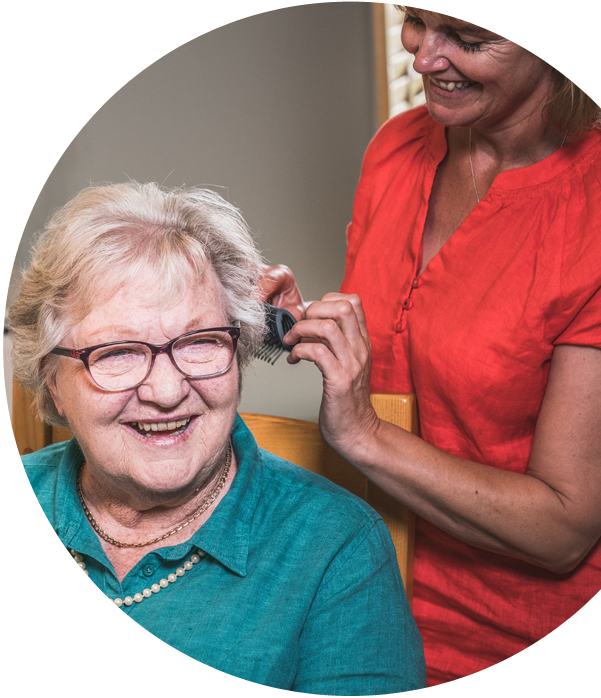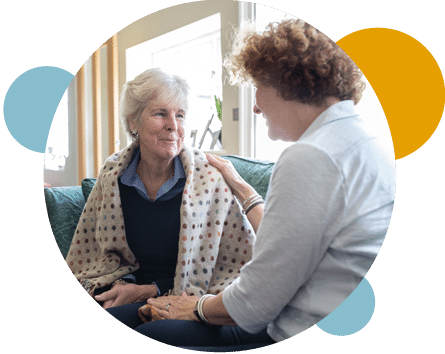What are the stages of dementia and how long do they last?
The seven stages of dementia chart is a tool that helps to understand the how the illness progresses. It should be noted however that every person is unique, and how quickly they move between stages is dependent on a number of factors, such as the type of dementia, and physical health, which can affect the ability to carry out daily tasks. The most commonly used scale is often referred to simply as GDS or by its more formal name, the Reisberg Scale (or by the lengthy name “Global Deterioration Scale for Assessment of Primary Degenerative Dementia”).
The GDS divides dementia into seven stages based on the amount of cognitive decline a person with dementia may experience:
| Stage | Level of Functional Decline | Expected Duration of Stage |
| Stage 1 | No cognitive decline | N/A |
| Stage 2 | Very mild cognitive decline | Unknown |
| Stage 3 | Mild cognitive decline | 2- 4 years |
| Stage 4 | Moderate cognitive decline | 2 years |
| Stage 5 | Moderately severe cognitive decline | 1.5 years |
| Stage 6 | Severe cognitive decline (Middle Dementia) | 2.5 years |
| Stage 7 | Very severe cognitive decline (Late Dementia) | 1.5 – 2.5 years |
Stage 1-3 – mild dementia
The first stage of dementia may happen months or a year or more before any symptoms present in a person. During this time, a person and others around them may not know that dementia is developing. A person will be generally well, living with independence and maintaining their lifestyle.
As the person transitions through the very mild, and mild dementia stages, they may start to show some symptoms, that they or others notice:
- Problems with memory – for example, not knowing where they put their keys or glasses
- Communication problems – struggling to find the right words or getting lost in sentences
- Issues with planning and organisation
- Concentration issues – getting distracted from day-to-day tasks and routines
- Changes in mood and personality – may display a lack of motivation for everyday life
- Losing track of place and time
This stage of dementia is often referred to as early-stage dementia and can last on average two to four years.
Stage 4-5 – moderate dementia
During the next period of dementia, symptoms are classed as moderate. Whilst moderate, they tend to be very clear to others. The person living with dementia is likely to be losing independence and may be struggling with daily living tasks.
Memory issues are more severe during this stage and a person can become confused about where they are.
Communication becomes even more challenging with incidences of forgetfulness and/or finding the right words increasing. Judgement is impacted at this stage and a person may not take as much care of themselves, with personal hygiene standards not being maintained. Incontinence is also very common during this stage.
The most significant change at this dementia stage is the impact on a person’s mood and behaviour. Difficulties with sleeping and frustration result in aggressive behaviour in some people. Repeating actions or words and wanting to leave the home and getting lost are also common behaviours at this stage.
This stage of dementia is commonly referred to as mid-stage dementia. This is generally the longest stage in a person’s dementia journey lasting between two and ten years.
What stage of dementia is sundowning?
Sundowning is a symptom that occurs in some people with dementia, particularly in the middle and later stages of the condition. Sundowning refers to the tendency of some people with dementia to become more agitated, confused, or restless in the late afternoon or evening. This can lead to increased confusion, wanting to leave the home, and difficulty sleeping, which can be challenging for carers and family members.
Stage 6-7 – severe dementia
This dementia stage is typically referred to as late-stage dementia or advanced dementia. It is characterised by severe decline in cognitive and physical function.
People in the advanced stages of dementia become increasingly frail and depend more on other people for support, even for basic tasks such as eating and mobilising.
However, even in the advanced stages the person may experience moments of lucidity (being aware of their situation) and they are always aware of how they are feeling, even if they do not quite know what made them feel that way.
The person’s reactions are likely to be influenced by their environment and how they feel. For example, they may react more positively if they are in a familiar environment or one where they feel comfortable. Communication becomes increasingly challenging and some people during this stage are not able to verbalise at all.
It is likely at this stage a person will require higher levels of care and support to complete day-to-day tasks, like eating and personal care. At stage seven, it is likely that a person living with dementia will be spending most of their time in their bed.
This stage of dementia is the shortest in a person’s journey, typically lasting no longer than three years.
How is each stage of dementia determined?
If you feel your loved one is experiencing any of the challenges dementia presents, it is important to get a diagnosis as soon as possible. This enables the person and their families to adapt and put in place the right programme of care and support.
There is no single test that can determine whether you have dementia or not. A diagnosis will be based on a range of tests and your medical history. If your loved one is exhibiting symptoms of dementia, you should contact your GP for an assessment in the first instance. It is worth remembering that not all confusion and memory loss means your loved one has dementia.
It is important to rule out other health conditions that may be the cause of the symptoms, including a urinary tract infection (UTI) or thyroid problems. A GP will be able to rule out other physical causes for the problems your loved one might be experiencing.
The GP will ascertain whether your loved one is having any problems with concentration, memory, reasoning and spatial awareness. Depending on the outcome of the GPs assessment, they may refer your loved one to a specialist memory clinic to an assessment team or a dementia specialist to understand if there is some sort of cognitive impairment.
When you attend a memory clinic, the specialist will talk to you about your concerns. They will be seeking to better understand your loved one’s experiences. The experts will listen to your concerns so they can build up an accurate picture of what has been happening. Your loved one will then undergo a series of cognitive assessments and brain scans to better understand the dementia timeline for your loved one and what stage of dementia they are at.
Memory test
Following an initial consultation, it will be possible to get a deeper understanding of your loved one’s current cognitive function including memory. The first stage is to conduct a Neuropsychology Assessment or ‘memory clinic test’ as it is more commonly known.
This assessment will determine how well each part of the brain (known as lobes) is functioning. The test is focused particularly on understanding recall and short-term memory. Both are usually impacted if someone is living with dementia. If a person struggles to complete the memory test successfully, this may indicate damage to part of the frontal lobe, or temporal lobes of the brain. The frontal lobe controls thinking, planning and problem-solving. The temporal lobes are responsible for memory.
To determine how the brain is functioning, a member of the team will conduct a general screening. Many teams use the Addenbrooke’s Cognitive Examination third edition, known as ACE-III. This tests attention, orientation, memory, language, visual perceptual and visuospatial skills. It is useful in the detection of cognitive impairment. It is especially helpful in the detection of Alzheimer’s disease, but more detailed testing may be needed iffrontal-temporal dementia is suspected.
MRI or CT brain scan
The memory clinic may then organise an MRI or CT scan of the brain. This will enable them to understand whether there is damage and to what part of the brain. An MRI in particular will give information on the brain’s blood supply. This will determine if any blood vessels are affected which is impacting memory. It will also identify any brain swelling or a tumour.
Consultation
Once the team have the results of the MRI scan, they will discuss with you and your family the diagnosis and outline next steps in terms of treatment and any support you require.
It may be that you are asked to return to the memory clinic in a few months’ time so further tests can be done to see how your condition has progressed.
How live-in care can help at each dementia stage
It is possible for a person to live well during the seven stages of dementia in their own home with the right care in place. At The Good Care Group, our carers are trained to understand the effects of dementia throughout all seven stages of dementia and provide the appropriate live-in care.
Early-stage dementia
At this stage our carers will focus on ensuring the person living with early onset dementia is able to live as independently as possible with the support they require. Our care is always provided in a way that looks to enhance their well-being.
Living well with dementia strategies can be put in place to support memory loss – writing to do lists, settling on one place to keep certain items, like wallets and keys, and having a pad close by to take notes.
Healthy lifestyle choices will be encouraged and actively promoted by our carer. Eating well and exercising regularly, as well as keeping the brain active through puzzles, reading and socialising are all proven to have a positive impact on well-being.
A person in the early stages of dementia is likely to experience changes in their mood and easily become anxious, depressed or more easily annoyed and some will lose interest in their life. Our carers are trained to work with people in this situation and encourage and stimulate positive attitude and thinking to lift spirits and enhance well-being.
It is important at this stage that families communicate with each other and plan for the future. If you are caring for your loved one at this stage it is prudent to research care providers and costs of care so you are ready to make an informed decision as their needs increase.
Mid-stage dementia
While everyone’s journey with dementia is different, the signs of the middle stage of the disease can mark the moment when changes to the care arrangements are necessary. The middle stage can be the longest and sometimes the most challenging for the person living with dementia and those that care for them.
Our professional carers are trained to identify changing care needs and move at the person’s pace, adapting their approach as needs increase. They can offer the physical support needed for example help with bathing, dress and eating, as well as encouraging gentle exercise that maintains strength and mobility. If personal hygiene is becoming an issue, our sensitive carers are on hand to make sure your loved one’s hygiene standards are maintained. As their diet changes, a live-in carer is there to ensure they get a healthy, balanced and nutritious diet and that hydration is maintained.
The carers employed by The Good Care Group are sensitive to emotions and respond positively to any signs of distress, finding shared, simplified language that enables the person living with dementia to communicate and express feelings.
Late-stage dementia
Dementia in all forms is a progressive condition. By the time it reaches later stages, it is very likely that you will need 24-hour care and support. During this stage, the person living with dementia is likely to have become extremely frail with severe memory loss. They may have trouble with communicating, eating and even swallowing. They may also spend long periods of time inactive and become prone to infections.
Communication is key at this stage. All our carers are trained to have meaningful interactions with those they are caring for when speech is limited – eye contact, gestures or shared experiences all provide ways to make a connection. Listening to a piece of music together can help someone feel safe, connected and loved.
During late-stage dementia, more specialist medical care may be needed. At The Good Care Group, our care teams are supported by leading clinical experts in the field of dementia care who guide our approach to ensure a person can live well with dementia at home. Carers can draw on the expertise of our in-house Consultant Admiral Nurse and Occupational Therapist.
Carers proactively use techniques required for safe moving, pre-empting medical issues, and identifying infections that reduce unnecessary hospital admissions. For many, our care is life-changing with fewer falls, less infections and reliance on antipsychotic drugs.
Dementia life expectancy
As everyone’s experience of dementia is different, so is the rate at which it progresses. The type of dementia will also impact life expectancy. Dementia is a progressive disease, and sadly for all those living with the condition symptoms will worsen over time. The Alzheimer’s society publishes average life expectancy figures for the most common types of dementia:
Alzheimer’s disease – eight to ten years, although shorter for those diagnosed in their 80s or 90s where other health conditions are likely to be prevalent. Some live for 15 years or longer.
Vascular dementia – around five years. A person with vascular dementia is more likely to pass away from a stroke or heart attack than from dementia.
Dementia with Lewy bodies – around six years. The physical symptoms of this type of dementia increase the risk of falls and infections.
Frontotemporal dementia – about six to eight years depending on other health conditions the person is living with.

What type of care options are available for dementia?
Here we explain the benefits and limitations of the options available to you.
Benefits
Live-in care
- One-to-one care, tailored to the person. This is the best care for all seven stages of dementia as the carer deeply knows the person and how to respond to changing needs
- The person can stay in the comfort and familiarity of their own home. Familiar surroundings are important to those living with dementia
- People do not have to be separated from beloved pets
- The person can live life their way with choice and independence
- The person can take part in social activities tailored to the person’s wishes such as going to a cafe, or even the theatre
- Complex needs can be supported during late stage or advanced dementia
- Improved health outcomes – fewer falls, lower rates of infection, hospital admissions and the use of antipsychotic medication for those with dementia
- Safest type of care during the COVID-19 pandemic
- Peace of mind for you and your family
- Comparable costs to dementia care in a quality nursing home – very cost effective for couples
- Estate remains with the family
- Familiar faces, which is welcoming to those living with dementia
- Meals are individually prepared according to the person’s personal preferences
Visiting/domiciliary care
- One-to-one care
- Flexible number and frequency of visits
- Cost effective where care needs are low
- The ability to stay at home with support and not move into a care home
Care homes
- A safe and secure environment
- No home maintenance required
- Arranged activities and social events
- Can still be part of local community if moving locally
Limitations
Live-in care
- Adjusting to a carer being in your home
- A spare room is needed for the carer to sleep in
- Home modifications may be required if the person needs support on the stairs for example
- Home maintenance still required
Visiting/domiciliary care
- Short visits do not always facilitate a deep-rooted relationship to be formed and can be confusing for a person with dementia
- You won’t be guaranteed the same carers. Unfamiliar faces can cause anxiety for a person living with dementia
- Short visits do not allow for quality care of specialist or complex conditions like advanced dementia
- Visiting carers increase chances of COVID-19 transmission
- No care and support during the night. For many care is crucial during the night to ensure a person is safe and well
Care homes
- Stress and upheaval of leaving a much-loved home. This can cause much distress for a person at any stage of their dementia journey
- Leaving a loved community
- Loss of family pets
- Moving all your possessions into one room
- Family home sold to pay for care home fees leaving nothing for the family
- Care team ratios – one carer will be looking after 4/6 residents with different needs
- Imposed routines – life is driven by fixed daily patterns (waking, eating, socialising)
- Higher rates of hospital admissions and infections, including Coronavirus
- Not getting on with other residents
Useful resources
To support you and your family we have created a useful dementia care guide which provides you with information and advice on how to provide person-centred dementia care following a diagnosis of dementia. There are also a number of dementia charities across the UK who provide families with help, advice and support when they need it most, including dementia UK and the Alzheimer’s society.
Talk to us about your dementia care needs
Our friendly and experienced team is here to help you and your family make sense of the options available to you. Call us today – we will help you every step of the way.

